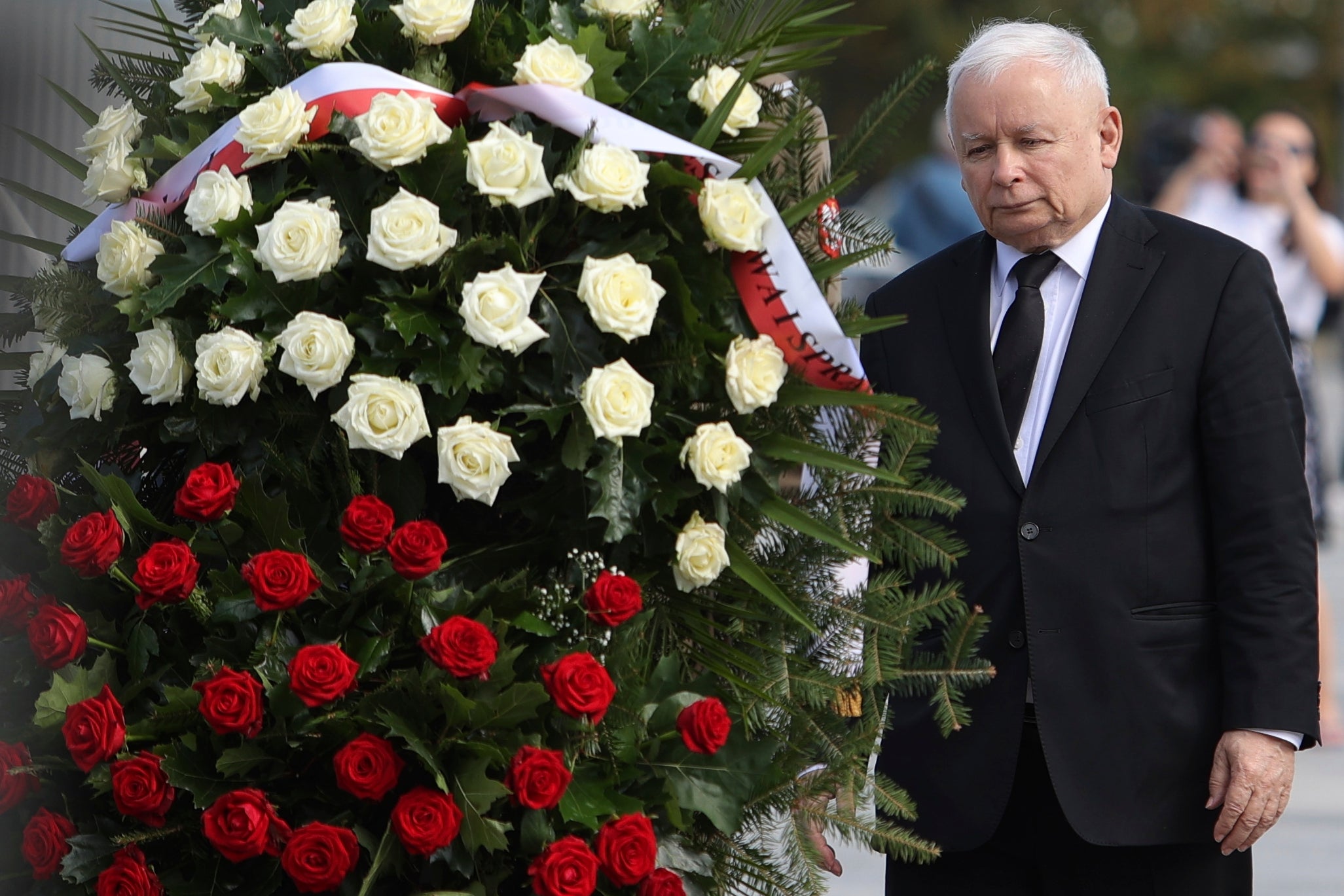Poland’s ruling party leader claims Germany is seeking to dominate Europe
Jaroslaw Kaczynski originally snubbed German offer of anti-missile systems before Poland eventually accepted them

Poland’s ruling party leader has claimed Berlin is seeking to dominate Europe, and warned that Poles could end up under the “German heel”.
Jaroslaw Kaczynski previously snubbed a German offer of anti-missile systems before Poland eventually accepted them – but he still managed to get in an anti-German dig along the way.
Ahead of elections next year, Mr Kaczynski and the nationalist conservative ruling party that he leads have been lashing out at Germany while claiming their main competitor is loyal to Berlin.
Many Poles, like others in central Europe, have been critical of Germany’s stance toward Russia in the years leading up to the invasion of Ukraine, particularly for gas deals that created dependence on Russian energy and helped Moscow build up its war chest.
But critics of the ruling party, Law and Justice, say its anti-German rhetoric is becoming a threat to Poland’s national interests and risks creating a division between Western allies while Russia wages war in Ukraine.
They have been especially critical of the party’s vacillations over whether to accept a German offer to deploy three Patriot missile defence systems to Poland after a stray missile fell near the border with Ukraine last month, killing two Poles.
Mr Kaczynski reacted coolly to the offer early on, and said the Patriots should be placed in Ukraine instead – something unacceptable to Germany.
He also said that “Germany’s attitude so far gives no reason to believe that they will decide to intercept Russian missiles”.
Defence minister Mariusz Blaszczak finally announced on Tuesday that Poland would accept the Patriots after all. But he added that he was “disappointed” to have to accept Germany’s “decision to reject the support of Ukraine”.
Critics of the government see such slights as an electoral tactic meant to win votes from older Poles who remember the Second World War, which was sparked by Nazi Germany’s invasion of Poland in 1939. The war killed 6 million Polish citizens, about half of them Jews.
But many Poles also have positive associations with modern Germany, having studied or worked there.
Their large western neighbour is a major trade partner to Poland and an ally in Nato and the European Union, and President Andrzej Duda is expected to visit Berlin on Monday.
Law and Justice faces a tough road as it seeks to win a third term, with challenges including soaring inflation – currently running above 17 per cent – and billions of euros blocked by the EU over what the bloc views as democratic backsliding under the conservative party.
It remains unclear how successful anti-German rhetoric will be in the elections next year when anxieties in Poland are more focused on the war in Ukraine and the economy.
This week a Polish government official visited Berlin to press government demands for 1.3 trillion dollars (£1.06 trillion) in Second World War reparations.
Critics see the demand as an election tactic because Berlin has long said there is no legal basis for such payments.
The Warsaw government insists the bill is not timed to coincide with the election campaign and that compensation is a matter of fundamental justice.
Party leader Mr Kaczynski last year accused Germany, which is the largest country in the EU, of using its role in the bloc to try to rebuild the “Fourth German Reich”.
Last weekend, he returned to the theme of Germany’s alleged efforts to strip sovereignty from EU states and dominate Europe. He claimed that Berlin was using peaceful means to achieve aims that “it once wanted to implement using military methods”.
He also accused the main opposition party, Civic Platform, and its leader Donald Tusk of being loyal to Germany, saying they would bring Poland “under the German heel”.
Mr Tusk, a former EU leader, accused Mr Kaczynski’s party of eroding democratic norms and called for it to fulfil EU demands, both to safeguard democratic norms and unlock the billions in frozen euros that are part of a pandemic recovery fund.
The allegations of Mr Tusk’s loyalty to Germany are often repeated by state media and government loyalists.
During a parliamentary session last week, deputy climate minister Jacek Ozdoba requested a break in proceedings “so that Civic Platform can watch the match of its German national team” in the World Cup. It led to an uproar in the assembly.
Law and Justice has successfully tapped into memories of German atrocities to win votes in the past.
In the 2005 presidential election, the party revealed that Mr Tusk, the frontrunner, had a grandfather who served in Hitler’s army.
Mr Tusk’s grandfather was a Polish forced labourer who was enlisted against his will in the Wehrmacht and later fled to join the Polish army.
The “Wehrmacht affair” hurt Mr Tusk, and he was defeated by Lech Kaczynski, the late twin brother of the current party leader.
Subscribe to Independent Premium to bookmark this article
Want to bookmark your favourite articles and stories to read or reference later? Start your Independent Premium subscription today.

Join our commenting forum
Join thought-provoking conversations, follow other Independent readers and see their replies